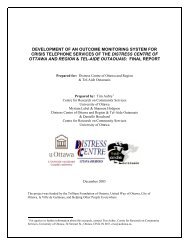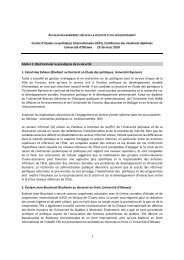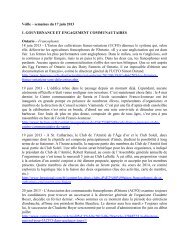Full text - Faculty of Social Sciences - Université d'Ottawa
Full text - Faculty of Social Sciences - Université d'Ottawa
Full text - Faculty of Social Sciences - Université d'Ottawa
Create successful ePaper yourself
Turn your PDF publications into a flip-book with our unique Google optimized e-Paper software.
Volume 3: pages 75–79<br />
March/mars 2009<br />
www.ipc.uOttawa.ca<br />
Revue de L’<br />
IPC<br />
R E V I E W<br />
Blueprint for Effective<br />
Crime Prevention in Canada:<br />
The National Crime<br />
Prevention Strategy<br />
Daniel Sansfaçon, PhD, & Lucie Léonard<br />
National Crime Prevention Centre<br />
The articles by Peter Homel and Enver Solomon describe some <strong>of</strong> the major<br />
international experiences in recent years in the design and implementation <strong>of</strong><br />
national crime prevention strategies – they also provide a stimulating overview<br />
<strong>of</strong> what they feel can be learned from these experiences, and <strong>of</strong> what might be<br />
most relevant to Canadian practitioners and decision-makers.<br />
Both authors attempt to identify some <strong>of</strong> the common themes in contemporary<br />
crime prevention, and some <strong>of</strong> the lessons from these experiences that could<br />
be applied to Canada’s current situation. Homel assesses a number <strong>of</strong> national<br />
strategies, with an emphasis on recent developments in Australia and England<br />
and Wales. He identifies a number <strong>of</strong> features <strong>of</strong> modern prevention, including:<br />
multi-sectoral action based on the use <strong>of</strong> multiple interventions, focused<br />
analysis, and evidence based interventions with a strong outcome focus and<br />
an emphasis on locally “driven” initiatives. Solomon focuses primarily on<br />
assessing the UK’s experience under the Labour government, which took<br />
power in 1997. He identifies a number <strong>of</strong> areas where Canada might pr<strong>of</strong>it<br />
from observing others. These include lessons related to: setting centrally<br />
directed targets, creating organizational silos within silos, using evidencebased<br />
approaches, attempting to balance enforcement and prevention and<br />
addressing the “implementation gap”.<br />
How do these international experiences apply to the Canadian situation or,<br />
in other words, what should Canada learn from others? In this con<strong>text</strong>, it is<br />
useful to provide an overview <strong>of</strong> recent developments <strong>of</strong> the National Crime
















